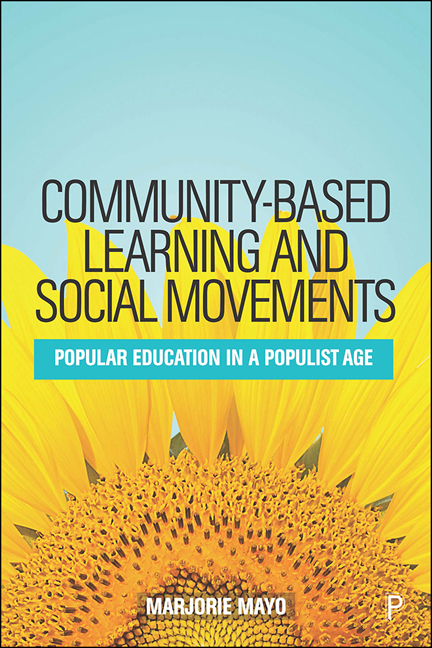Book contents
- Frontmatter
- Dedication
- Contents
- List of Figures
- Acknowledgements
- 1 Popular Education in a Populist Age
- 2 Popular Education and its Roots
- 3 Spaces and Places for Popular Education and Participatory Action Research
- 4 Principles and Practice
- 5 Sharing Understandings of Varying Histories and Cultures
- 6 Making Connections: Linking Issues and Struggles Across Space and Time
- 7 Power and Power Analysis
- 8 Community–University Partnerships
- 9 Taking Emotions into Account
- 10 Looking Backwards, looking Forwards
- References
- Index
10 - Looking Backwards, looking Forwards
Published online by Cambridge University Press: 10 March 2021
- Frontmatter
- Dedication
- Contents
- List of Figures
- Acknowledgements
- 1 Popular Education in a Populist Age
- 2 Popular Education and its Roots
- 3 Spaces and Places for Popular Education and Participatory Action Research
- 4 Principles and Practice
- 5 Sharing Understandings of Varying Histories and Cultures
- 6 Making Connections: Linking Issues and Struggles Across Space and Time
- 7 Power and Power Analysis
- 8 Community–University Partnerships
- 9 Taking Emotions into Account
- 10 Looking Backwards, looking Forwards
- References
- Index
Summary
Much has been written about the Far Right, fake news and post-truth since I began thinking about this book. This would seem to be a fastmoving situation. As one of those writing about the Far Right reflects, ‘Things change so quickly’ (Hawley, 2019: 1), and statements about such rapidly changing social movements ‘can transition from being perfectly accurate to woefully outdated with shocking speed’ (2019: 1). There is not space here to review these writings in detail, let alone to try to keep up with the shifting ground of Far Right movements in the UK and elsewhere. Rather, the point to emphasise is simply this: Far Right mobilisations continue to present serious challenges. And so do the underlying causes of the growth of Far Right populism, the political, social and cultural causes as well as the material causes, rooted in increasing insecurities, injustices and widening social inequalities.
Sadly I have not come across any convincing evidence to persuade me to the contrary. Rather the reverse. Since I began writing this book there have been disturbing increases in the incidence of racist, anti- Semitic, Islamophobic and homophobic hate crimes, both in the UK and elsewhere. And there have been horrific manifestations of White Supremacist violence – from Charlottesville, USA to Christchurch, New Zealand – illustrating the most extreme expressions of the politics of hate. Far from diminishing, these challenges seem to have been growing in recent years.
But so has the flip side of this particular coin, the growth of popular mobilisations for progressive alternatives for the future. So what might be the implications for popular education in populist times? And how might popular educators contribute to the development of these mobilisations for progressive alternatives, burgeoning movements for social transformation?
The first part of this chapter summarises the reasons why a structural approach to understanding the underlying causes of people's frustrations continues to have relevance, drawing on the insights to be offered by a Marxist analytical framework, along with the insights to be provided by feminist and psycho-social approaches. This leads into the discussion of the continuing relevance of popular education and participatory action research building on the approaches that have been developed by Paulo Freire and others, in their differing contexts.
- Type
- Chapter
- Information
- Community-based Learning and Social MovementsPopular Education in a Populist Age, pp. 175 - 186Publisher: Bristol University PressPrint publication year: 2020



